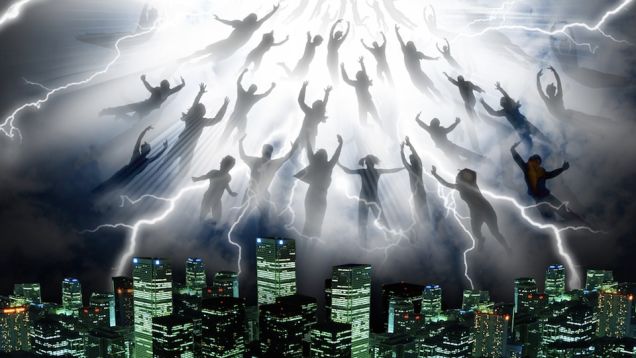Revisiting the Rapture — Is It Imminent?
This topic is like a minefield with many hazardous conclusions drawn from texts taken without context. This article offers a broader spectrum of ideas and contexts than most Christians have considered.
If you Google “Rapture September,” more than a million results suggest this is on people’s minds. Some are even having dreams about it. Others ask, Does not knowing the day or hour apply to the 2nd coming or to the rapture?
The idea that Christ would suddenly take Christians to heaven before the end-time period of tribulation was unknown before John Darby promoted it in the 1830’s. William Miller began preaching then and the “Great Disappointment” in 1844 was a result, but this does not mean the idea is un-Biblical.
The book of Revelation shows the last of seven churches in a deplorable state: “I know your deeds, that you are neither cold nor hot. I wish you were either one or the other! So, because you are lukewarm—neither hot nor cold—I am about to spit you out of my mouth. You say, ‘I am rich; I have acquired wealth and do not need a thing.’ But you do not realize that you are wretched, pitiful, poor, blind and naked.”
If we can believe the “true witness,” this diagnosis suggests we are not ready for a rapture which its supporters say occurs in verse 1 of the next chapter when John is told ““Come up here, and I will show you what must take place after this.” Rev 4:1.
But if we are honest, we must admit that it’s a jump to conclude that means a rapture of the wretched group that we saw a few verses earlier. It’s true that the word “church” is not found later in Revelation, but the “watershed” event that initiates end-times that separates the past, present and future may mean that the church era is over and we move, either to becoming the Bride of Christ, or if unfaithful, to being part of the harlot who rides the beast of New World Order, Rev 17:1-3.
As this nation moves loses freedoms in a move toward global government, “one taken and another left” may mean taken to a FEMA camp because when the disciples asked “Where,” Christ said, Where the body is, there will the eagles be gathered,” Luke 17:36,37. The dinner of the birds in Revelation 19:17,18 is not about a rapture—we don’t want to be “taken,” contrary to a popular fictional series of books and movies.
The oft-quoted text that Christ will keep us from the hour of temptation that shall try the world does not necessarily mean a rapture to avoid the tribulation. The hour of temptation might mean the short period of time that Satan impersonates Jesus, working miracles to deceive the whole world because they “received not the love of the truth.”, 2 Thessalonians 2:9,10.
We might be poor Bible students to conclude that being kept from the hour of temptation means we get a waiver for the tribulation when the Bible says, “We must through much tribulation enter into the kingdom of God.” Acts 14:22. This is said different ways in different passages, but it’s about our character development.
After diagnosing our “pitiful” condition, Christ says to buy of Him “gold refined in the fire.” Rev 3:17,18. It’s been said that most of Revelation is a synthesis of previous Bible passages that meet and end in the Revelation. Our familiarity with the whole Bible tests our ability to interpret Revelation without jumping to conclusions.
The gold tried in the fire comes from Malachi 3, the last book in the Old Testament where we see God’s intent to purify or refine us as gold, a passage sung in Handel’s Messiah at Christmas. The information comes from the “messenger of the covenant whom [we] desire,” Mal 3:1-3.
What does that mean? We’ve been dancing around the topic, but rapture or no-rapture depends on our understanding of the wedding parables. We can become the Bride of Christ by making a covenant, but how?
Christ’s parable of the 10 virgins who are asleep with their lights out suggests that we don’t understand this topic. Their being out of oil for their lamps means they can’t see how to get to the wedding. Maybe that’s us.
Oil comes from the two olive trees representing the Old and New Testaments in Zechariah 4. Christians who are short on oil may be lacking an understanding of the Old Testament.
God afflicted Egypt for their many gods, their oppression of God’s people, and for their murder of infants. America has many parallels to Egypt as the greatest nation, a bread-basket for the world in time of famine, but its murder of the unborn and the oppression of Christians may be just beginning.
God attacked the gods of Egypt like the Nile—their economy depended on it like we depends on the dollar. We are about to see God’s judgments on America, in a re-run of Exodus 5-12. Then God took Israel to a covenant and later said, “I am married unto you,” Jeremiah 3:14, KJV. That’s how we marry Christ!
God regarded the covenant relationship as a marriage and Paul includes the Exodus in “all those things happened to them for examples…ends of the world.” 1Cor 10:1,11.
God got an ignorant bride at Sinai—they worshiped a golden calf 40 days later, but their trials in the wilderness proved what was in their hearts. “The heart is deceitful” Jer 17:9. To believe we are ready for heaven may be wishful thinking. It’s been said that a couple is never really married until they have their first serious disagreement and survive it.
When Christ discussed end-times, He said to understand the book of Daniel which has potential life or death situations in chapters 1-6. Daniel 1 is about the king’s healthcare that Daniel wisely declined. Dr. Ben Carson said Obamacare is the worst thing since slavery. If we study Daniel, we are able to see other parallels to what’s coming.
It does look like the image in Daniel 2 (representing the kingdoms of this world), is getting ready to fall financially and “in the days of these kings shall the God of heaven set up a kingdom…” Dan 2:44.
How will He do it? “God declares the end from the beginning,” (Isa 46:10) and in the beginning when God took Israel to a covenant, He said, “If you will keep My covenant, you will be to me a kingdom,” Exod 19:5,6.
Now we can understand the disciples’ question, Will you at this time restore the kingdom to Israel? and Christ’s reply, “It is not for you to know the times and seasons,” They were looking for an external kingdom and He linked it to times and seasons, a phrase used only once more in the New Testament King James. It’s when the 2nd coming is imminent.
Paul says we which are alive will be caught up when Christ comes with the “trump of God.” 1Thess 4:16,17. He further shows this “at the last trump” in 1 Cor 15:52, We are about ready to start the 1st of seven trumpets in Revelation 8. We expect economic collapse because the grass decodes to riches, comparing Rev 8:7 with James 1:9-11 in the King James. This means we are “caught up” at the 2nd coming “at the last (7th) trumpet.”
Paul continues…“But of the times and seasons,…the day of the Lord [the end-time apocalyptic period as seen in Joel 2:10,11] comes as a thief in the night. For when they say, ‘Peace and safety!’ then sudden destruction comes upon them, as labor pains upon a pregnant woman.” 1Thess 5:1-4. Most people would agree that the US-Iran nuclear deal is ‘Peace and safety’ talk.
We could expect economic collapse and martial law to put us into bondage like Egypt from which God will deliver us with labor pains as He did with Israel, His “firstborn.” Exod 4;22. He took Israel from sudden, destruction to a covenant and Paul included that history of the Exodus for us in 1 Cor 10:1,11.
That’s it! That’s how we become His kingdom. “We must through much tribulation enter into the kingdom” and by making a covenant signaled by calamity that causes a midnight cry, (Matt 25:6; Exod 12:29,30), we also become His Bride.
But the covenant is not some new deal. It’s the same law, but God promises to give us a new heart so we will want to do what it says. Ezek 36:25-27.
Christ said, “Till heaven and earth pass, not one jot or tittle shall pass from the law till all be fulfilled.” We are thankful that He fulfilled the animal sacrifices of the law. We don’t have to kill animals. But He also magnified the law to say if we are angry with our brother, we may be guilty, or if we lust after a woman, it’s like committing adultery in our heart.
Maybe we can see now that the church isn’t ready for rapture until we have had the New Covenant Promise fulfilled to us. Until then, we can all say with Paul, “the good that I would, I do not…” Romans 7.
What’s coming will drive us deeper into the things of God or, if bent on our own way, they will harden us as Pharaoh. The Good News is that God has a plan and we can be included if we are seeking to understand His ways and conform to His will as we claim His promises. HalleluIA.
EDITORS NOTE: Dr. Richard Ruhling is author of The Alpha & Omega Bible Code, an ebook that’s had mostly five-star reviews on Amazon at http://www.amazon.com/dp/B010CFNMCU, but readers can get a pdf with a bonus for visiting his website at http://TheBridegroomComes.com



